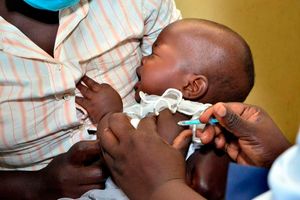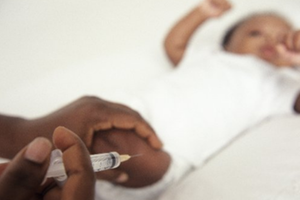Babies at risk as hospitals run out of rotavirus vaccine

What you need to know:
- The rotavirus causes diarrhoea and other intestinal complications. It is very contagious and is the most common cause of diarrhoea in infants and young children worldwide.
- Some of the symptoms of the rotavirus include severe diarrhoea, vomiting, fever, stomach pain and dehydration.
Ms Alice Nafula, a mother of two, is a distressed woman. For the past three weeks, she has been moving from one hospital to another in search of a rotavirus jab for her baby.
She started at St Elizabeth Mission Hospital Mukumu in Kakamega County but she did not get the vaccine. She later went to Kakamega County Referral Hospital but she didn’t succeed.
“This time round I tried to check if I could get the rotavirus vaccine in Kisumu County Referral Hospital but I was not successful,” said Ms Nafula.
The mother of two is among many Kenyan mothers in panic mode after visiting hospitals to have their children vaccinated but were told the vaccine has run out of stock.
The shortage of the vaccine is not only being felt in Kakamega and Kisumu but across the country.
The vaccine is administered to children under five to prevent severe diarrhoea, vomiting, fever and abdominal pain.
But for the last three months, the vaccine has not been available in hospitals, exposing children under five to risk of being infected by the virus.
A spot check in health facilities in Nyanza and western regions indicated that the jab has not been available since November last year.
The rotavirus causes diarrhoea and other intestinal complications. It is very contagious and is the most common cause of diarrhoea in infants and young children worldwide.
Some of the symptoms of the rotavirus include severe diarrhoea, vomiting, fever, stomach pain and dehydration.
The vaccination is considered an effective public health strategy to prevent infection and reduce the severity of the disease.
The Ministry of Health says the shortage has been caused by the transition from the two- to three-dose vaccine regimen.
Dr Ouma Oluga, the Director of Health Services at the Nairobi Metropolitan Services, said new stocks will arrive soon.
“We have been asked to clear this stock and we are expecting a new supply by March. The stock-out is countrywide,” said Dr Oluga.
The last two-dose Rota vaccine supply from the Ministry of Health was in November 2021.
“The National Vaccines and Immunisation Programme is not doing resupply awaiting the new Rota vaccine programme,” said Dr Oluga.
In Kisumu, the County Director of Public Health Fred Oluoch said hospitals in the region are expected to receive the vaccines from next month.
“I am aware of the shortage. In fact, my child is among children who have missed the immunisation. This is due to impending changes from the two doses to three doses of the rota vaccine, which is administered to babies at six weeks, 10 and final dose at 14 weeks,” said Mr Oluoch.
According to Dr Bernard Awuonda, a paediatrician at Jaramogi Oginga Odinga Teaching and Referral Hospital in Kisumu, the vaccine is essential in protecting children against severe diarrhoea and vomiting episodes during infection.
“It is given to children to prepare their bodies to fight against rotavirus,” said Dr Awuonda.
“Lack of the vaccine makes the children prone to rotavirus attacks. In some cases, it can lead to death if not dealt with in time.”
Dr Jeremy Omondi of the Aga Khan Hospital said the rotavirus vaccine reduces the severity and length of acute diarrhoeal disease in children.
“Without the rotavirus vaccine, we expect to see more cases of children with severe dehydration following diarrhoeal illness. This subsequently leads to increased hospitalisation, longer stays in hospital and in the absence of good and prompt management or treatment, higher mortality rates from the same,” said Dr Omondi.
eojina@ke.nationmedia.com

